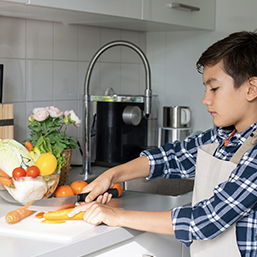
“Back in my day, I would walk five miles to the grocery store to buy milk, head to the chicken coop to collect eggs, and spend hours picking potatoes in the field. Then, I would come home and cook for the family. I was ten years old.”
\n \nThis is a story my grandfather likes to tell the kids in the family at special events whenever he asks if they've learned to cook yet. They usually respond with: “No, Grandpa. We’re only 12.”
\nAutonomy and self-reliance look different today, especially as technology continues to shape our lives. Cultural and socioeconomic differences also influence how independence is expressed. In some communities, children and teens may appear more autonomous due to environmental pressures and the need to adapt and survive. In North America, self-reliance in young adults often means being able to make appointments, speak with customer service workers, grocery shop, meal plan, budget, apply for jobs, and complete basic household tasks.
\nA really important point to consider is that self-reliance is tied to executive function skills – skills that develop in the brain’s prefrontal cortex well into our mid to late 20s. These include impulse control, emotional regulation, planning, organizing, time management, and problem-solving – essentially the skills needed to become capable, independent adults. Understanding that the brain is still developing in young people helps us stay patient when their efforts at independence are messy or inconsistent. Mistakes are part of the process, and ongoing support is essential.
\nSo how do we raise autonomous children and teens who grow into self-reliant adults? It begins in the early years. As soon as children start walking and talking, we can begin nurturing autonomy. When a child starts saying things like “Me do it!” it's the perfect moment to begin fostering independence – at an age-appropriate level, of course. This doesn’t mean toddlers should start cooking or budgeting. The tasks must be age-appropriate, but the strategies for building autonomy remain consistent across ages and stages:
\nFoster a growth mindset. Encourage kids to view mistakes as opportunities to grow. Language is powerful. As Peggy O’Mara said, “The way we talk to our children becomes their inner voice.” Scolding and harsh criticism every time a mistake is made can lead to a fixed mindset, where children fear challenges and give up easily. Instead, use encouraging phrases like, “You can’t do this yet, but we’ll keep practicing,” or “I saw how much effort you put into trying something new!” These help build resilience and positive self-talk, which are key components of building self-reliance.
\nUse scaffolding. This is a way of teaching that supports gradual exposure to new and challenging tasks using a step-by-step approach, while fading the support over time. For example, teaching a child to mop might begin with filling the bucket and guiding their hands through the motion. Over time, support is gradually removed and they’ll be able to move the mop on their own. Every child is different. Some will master tasks quickly, while others need support for longer. Be patient and thorough rather than expecting them to “just know” how to do something.
\nUse visuals and tools. Checklists, calendars, timers, and routine charts are excellent tools for promoting independence. They help kids remember tasks, manage time, and build routines – all of which strengthen executive function skills. Apps like Our Home, Tick Tick, Finch, and of course, the trusty Google Calendar app are some of our favorite tools for preteens and adolescents to foster these skills.
\nModel the behavior you want to see. The statement “You are your child’s greatest teacher” is a powerful one. Children learn most from what they observe. When you model calm regulation, walk through your planning process out loud, or break down how you solve a problem, you give them a map to follow. It takes patience, but this kind of modeling is one of the most impactful things you can do.
\nRaising self-reliant young adults doesn’t happen overnight. It’s a gradual process that starts with small, supported steps in the early years. By fostering a growth mindset, offering guided support, using helpful visuals and tools, and modeling independence ourselves, we empower our children to develop the skills they’ll need for a confident, capable future. It’s not about perfection. It’s about progress, with a healthy dose of patience along the way.
\n\n
Joanna and Lara (Registered Psychologist and Child Mental Health Advocate) started Psyched About Kids (PAK) in 2016 because they are obsessed with human potential! PAK empowers parents with science-backed knowledge, strategies and tools to solve our most pressing parenting issues today and make life a little easier, along with ongoing support to implement the desired change. Small actions over time can have an unimaginable impact on child growth and development for lifelong health and wellness. Learn more at psychedaboutkids.com.
\n\n
See our related articles:
\nCalgary’s Child Magazine © 2025 Calgary’s Child